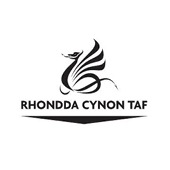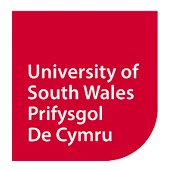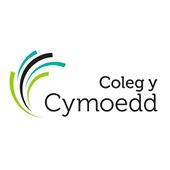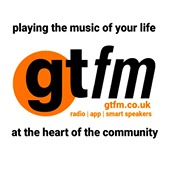Neil Jenkins and the Ponty band of brothers
Simon Thomas of Wales On Line interviews newly elected Pontypridd RFC President Neil Jenkins…
When Neil Jenkins thinks back to his days with Pontypridd, he still gets goose pimples. It was a magical time that brought him friends for life, league and cup triumphs and wonderful memories…not to mention the Battle of Brive!
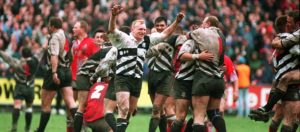
Now his huge contribution to the Sardis Road side, over more than a decade, has been recognised with his appointment as club president.
So it seemed an appropriate moment to catch up with the Wales kicking coach to talk about his Ponty days and his 30 years in rugby.
I go back a long way with Jenks, having been a cub reporter when he first burst on the scene. Indeed, I covered his home debut against Bridgend on Easter weekend 1990.
Inside a year, he was playing for Wales, launching a 91-cap international career that brought him 1,090 points, a Triple Crown, a Five Nations title and Lions glory.
When he finally hung up his boots in 2004, he moved pretty much immediately into coaching and has been part of the national team set-up since 2006, sharing in all the triumphs of the Gatland era.
But it was at Ponty that it all begun and his recollections are still crystal clear.
“It’s all vivid in my mind,” he said.“There are fantastic memories of playing and just being involved. Some good memories of putting on the black and white, that’s for sure.
“It seems a long time ago in one sense, but then in another it doesn’t. If you meet up with the boys or bump into them, it feels like you’ve just come off a game or just finished training.That’s what it’s like with the Ponty lot.
“The boys can turn up to a dinner now and it’s literally just like we played yesterday. It gives me goose pimples thinking about it.”
When I ask Jenkins to name the biggest characters in that Ponty team, you can sense him revisiting that Sardis Road dressing room.
“God alive, there were so many,” he replies. “The Chief (Dale McIntosh) was one, Phil John – Ghurka – would be another one. It’s incredible how he never played for Wales really.
“Steele Lewis was another one again. He would be at the forefront of everything. He would lead and everyone was scared of him anyway, bar Chief! Neil Eynon was a huge character in the team too and there were people like Denzil Earland and Jim Scarlett when I first started.
“You daren’t lay on the floor with boys like Denzil around. My first league game was Llanelli away and we ended up with 13 men because Jim and Denzil both got sent off. That was the way things were going to go for a few seasons.
“We were a very uncompromising team. It definitely wasn’t a place for the faint of heart in our dressing room. Chief would be going around knocking people about and Greg Prosser would be going the opposite way! I always used to laugh at it.
“But it wasn’t for the faint-hearted, that’s for sure. Bloody hell, you had to make sure you were ready for it. We expected to win, we expected to perform. Over a long period, that made us a very tough side to beat.”
Jenkins feels much of that success was down to both the quality in the side and the togetherness of the group.
“We had so many good players in the team, we were very lucky,” he said.
“But it didn’t matter who you were, where you were from, whether you played for Wales or not, you came back there and you were just one of the boys. There were no egos and if you did have one, you would have it knocked out of you pretty quickly.
“No matter how things had gone for Wales, good or bad, you could always go back there and just crack on.
“That was the good thing about it. It was like going back home and being back one of the boys. We would train hard, play hard and enjoy ourselves afterwards.”
The one-for-all, all-for-one spirit was never more evident than on a now legendary day in September 1997. Ponty were taking on the reigning European champions Brive in their French back yard in a crucial Heineken Cup group match.
What happened next is the stuff of rugby folklore and notoriety as violence erupted both on and off the field.
“I always remember we were standing in the tunnel before the game, side by side,” he said.
“Their loosehead Didier Casadeï comes out and he’s standing there, socks down, blowing kisses at us. He was your typical French prop really, just wanting to fight. He definitely got a fight, that’s for sure, on and off the pitch!
“I was captain and, behind me, Dale and the boys were going mad. You could sense, ‘here we go, we are ready to go today’.
“We were already fired up anyway because we had just lost at home to Bath, with a dubious decision where Mike Catt scored when the ball was over the dead-ball line. So it was a huge game for us. We needed to win and Brive were European champions.
“We had heard a couple of things about what they were like, in terms of how they played and some of the stuff that went on afterwards as well. They probably thought if they put it about, we would back down. Well they were certainly barking up the wrong tree with us lot!
“Some of the other sides they played against weren’t from where we were from and didn’t go about their business the way the boys did. I’m not saying that’s right. We shouldn’t have got involved in certain things and there were umpteen scenarios where we have been in trouble. But that was just the nature of how things were in them days. Brive picked the wrong side thinking we were going to back down.”
There was an edge to the game from the outside but then, on 25 minutes, all hell broke loose as a lengthy mass brawl erupted in the in-goal area, resulting in McIntosh and Brive’s Lionel Mallier being sent off.
The match itself was a thriller, with Ponty coming so close to pulling off a famous victory before ultimately going down 32-31.
“There was a lot of physicality in that game, a lot of fighting, but we stood toe to toe with them in the rugby as well,” said Jenkins. It wasn’t just that we could look after ourselves. We were a good rugby side too. We could play.
“They were an outstanding team, with some fantastic players, but we should have won that day. As a game in itself, I would be surprised if it’s not in the top ten European matches.”
The events after the game were pretty memorable too, as violence erupted once again.
“I remember them saying, come down we’ve got the Bar Le Toulzac in town,” said Jenkins.“We only found out properly afterwards that what tended to happen is they’d invite teams down there and end up fighting them.
“When we all turned up en bloc, I think they were ‘What’s going on here?’ That’s what we tended to do. If we were going, we were all going. When we were away, especially in Europe, we would have a drink and we would stick together. So we all went. And the rest is history, as they say. It was carnage.”
Just two weeks later, the sides met again in the return match at Sardis Road.
“I always remember the home game,” said Jenkins. “I’m not going to lie, we wanted to absolutely kick the living smoke out of them. We were desperate to. But we couldn’t. We were told categorically, there can not be any fighting, there can’t be any trouble. So it ended up being a 29-29 draw.”
As fate would have it, there was to be third meeting, with Ponty heading back out to Brive for a play-off in November.
“We were 18-0 down at one point, then we were winning 20-18,” recalls Jenkins.
“I always remember their coach Laurent Seigne screaming at the hooker Laurent Travers and Travers was going ‘I don’t know, we can’t seem to get rid of them, they keep coming’. In the end, they just won it at the death. I was going mental and their scrum-half Philippe Carbonneau was just nodding his head. I was like ‘you horrible bastard’. Not a nice guy. Great player, but horrible man.”
European glory eluded Ponty, but there were some historic domestic triumphs.
“The cup final victory over Neath in 1996 was probably the highlight,” said Jenkins. “We had worked hard for a period. We had lost in a couple of semis and a final. We were gutted in 1995 when we lost to Swansea in the final.
“I missed a few kicks that day and I was pretty down about it. I said to Dennis John after the game, ‘We will be back next year and we will win this mate, I’m telling you straight’ and we did.
“We beat Neath, who were an exceptional team, and we went on to win the league the next year. They were great times.”
Jenkins made 237 appearances for Ponty, in two spells either side of his years with Cardiff, accumulating 3,185 points. And now he has proudly accepted the post of Club President.
“I’m not quite sure what a President is and what the role is, I’m not going to lie!”, he quipped.“I will have to have a chat with Gerald (Davies) and Dennis (Gethin). But if I can help Ponty in any way, shape or form, I am more than happy to. It’s something to be proud of.”




